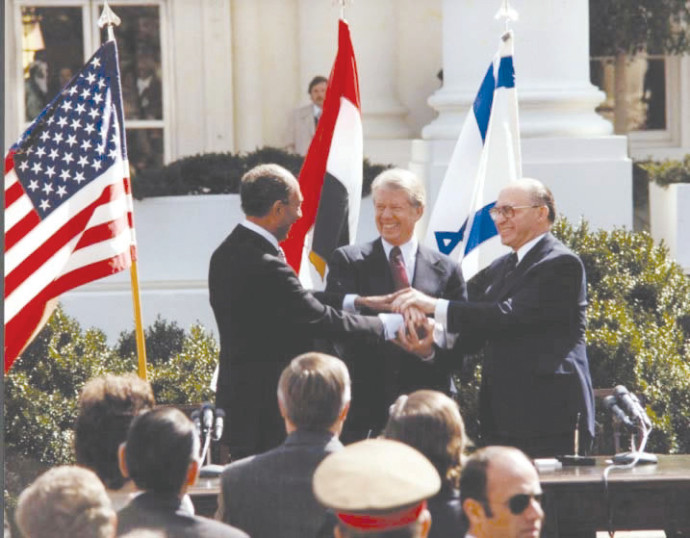I am actually looking forward to seeing how the new Netanyahu government will deal with regional relations and the Palestinian issue. What will be the impact of a fully right-wing religious government with Jordan, Egypt, the UAE, Bahrain, Morocco and especially the Palestinians?
For years, I have been trying to understand what is the strategy of Israel’s right-wing and religious political parties regarding the future of the land between the river and the sea and the millions of Palestinians living there. Now, without anyone from the Center or Left getting in the way, they can do whatever they believe needs to be done.
When the right-wing first took power in 1977 with the victory of Menachem Begin, it was soon made clear that Begin was prepared to give back all of Sinai to Egypt and he was also prepared to concede on Gaza, which he did not consider to be part of the land of Israel.
Begin had a strategy that was based on his belief that the Palestinians of the West Bank would accept some form of autonomy, less than a state, and Israel could live with that.
Within a short period of time, it became clear that there were no Palestinian partners for something less than a state and even Egypt ceased negotiations with Israel, realizing that the autonomy arrangement proposed by Begin and his government was far short of what Egypt could agree to on behalf of the Palestinians.

It took years before the Palestinians were even willing to accept the Egyptian peace treaty with Israel, and then they came to rely on Egypt’s help with Israel whenever needed. But the Palestinians never gave up their right to self-determination, nor did they ever empower any other country to negotiate on their behalf.
I always asked right-wing friends what were their solutions to the Palestinian problem. Never did I hear a serious answer. I recall, as part of the army reserve duty at the College for the Education of Officers, taking a group of army captains and majors to visit the Jewish community in Hebron. At the time, almost all of the officers at that rank were secular, unlike today.
The officers were simply dumbfounded when they asked the Hebron Jewish settlers how a few hundred Jewish settlers could live in peace with some 100,000 Palestinian Arabs in the city of Hebron.
Their answer was: God is with us; the Messiah will come and all of Israel’s victories prove that God supports the Jews in the land of Israel.
Netanyahu strategy
Netanyahu’s long years in office demonstrated his strategy, which never had a long-term view: keeping the Palestinians in a constant state of being just below the boiling point. Netanyahu voiced support for a two-state solution but never advanced negotiations that could inevitably lead to it.
Netanyahu’s tactics were to always find cause to blame the Palestinians for the failure of the peace process (not recognizing Israel as a Jewish state, providing money to the families of Palestinian prisoners, not representing all of the Palestinian people, etc.) while delegitimizing the Palestinian Authority leadership and keeping a weakened Hamas in power in Gaza.
Exploiting the fear of Iran, which is a common threat in the Arab Gulf together with a reactionary president in the White House, Netanyahu’s major political success was the Abraham Accords, which in his words proved that it is possible to make peace with Arab states without conceding on the Palestinian issue.
I believe that this is only a temporary situation and in the not-too-distant future, the reality on the ground in the occupied Palestinian territories will change quite radically.
As prime minister, Netanyahu brought relations with Egypt and Jordan to new lows that were significantly repaired by Yair Lapid in both the Foreign Ministry and the Prime Minister’s Office. I believe that with the new Netanyahu government we will see a return to the very cold relations with Jordan and Egypt.
Netanyahu’s new government won’t have anyone blocking the way to legalize the more than 100 illegal unauthorized outposts in the West Bank, which the right wing euphemistically calls the young settlements even though some of them are more than ten years old.
No one will block the removal of Khan al Ahmar or other Palestinian small towns. No one will prevent Ben-Gvir and other fanatic messianic Jews from praying on the Temple Mount.
Let’s see how Netanyahu manages the conflict when Ben-Gvir sets the region on fire. Increased Jewish prayer on the Temple Mount will lead to violence among Palestinians in Israel, the West Bank, Gaza, Jordan, Lebanon and will spill over to the Arab streets across the Middle East.
It is clear that there will be very little pressure from within the new Israeli government to act with moderation. Perhaps in the first months of the new government, some of the leaders of the Arab states that Israel has peace with can caution Israel’s leaders against what will be understood throughout the Arab world as incitement.
Netanyahu and the Saudi Prince
Saudi Crown Prince Mohammed bin Salman, who has met Netanyahu directly in the past can impress upon the Israeli prime Minister that Saudi Arabia is serious about not normalizing with Israel without significant progress on the Palestinian issue.
The Saudi prince and future king can also influence other Arab leaders to slow down normalization or even freeze relations if Israel provokes the Palestinians and Muslims on the Temple Mount or by increased settlement building and continued actions against the Palestinian people.
In the Likud campaign, Netanyahu promised us that we would see more Arab and Muslim states in peace agreements with Israel. I don’t see how that is possible. I don’t even know how it will be possible to sustain what already exists.
The writer is a political and social entrepreneur who has dedicated his life to Israel and to peace between Israel and its neighbors. He is now directing The Holy Land Bond.
